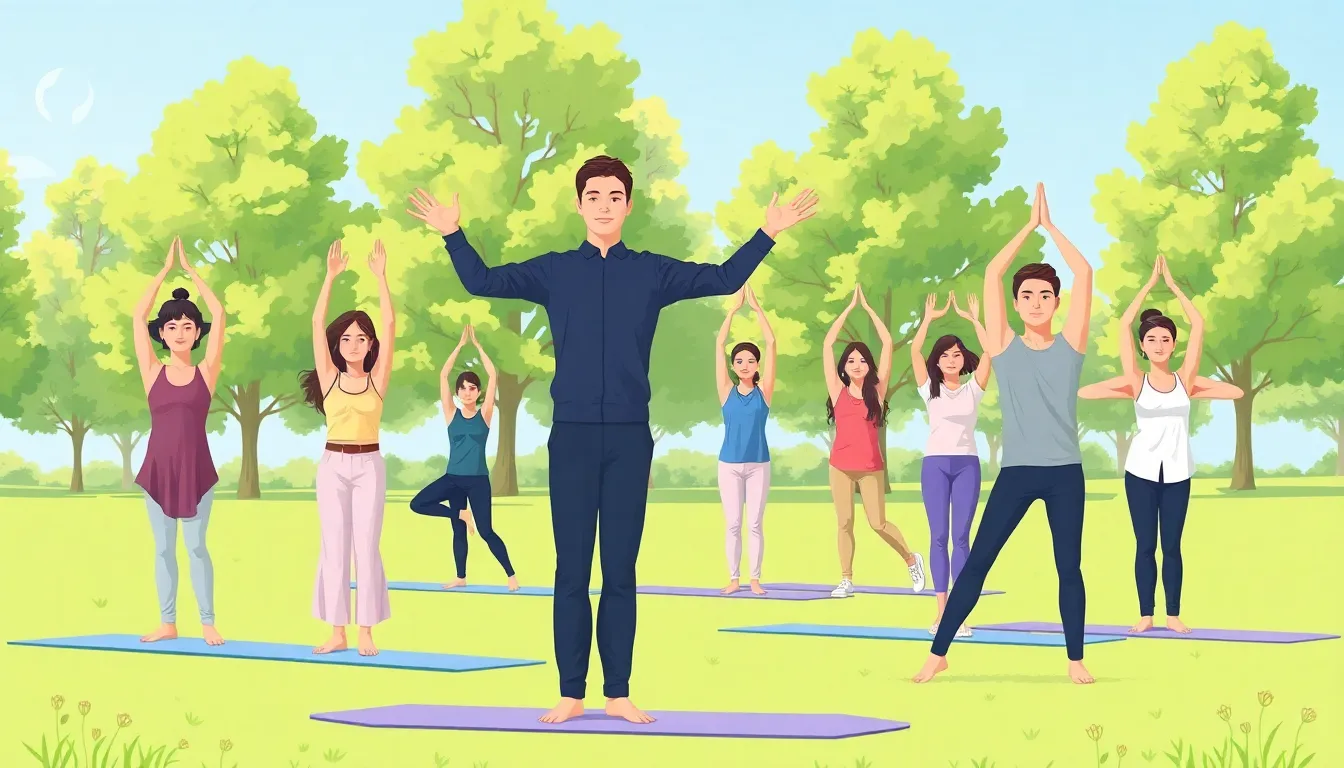In a world where stress seems to be the default setting, yoga emerges as a much-needed escape. Picture this: a room filled with serene souls, bending like pretzels while trying not to think about their never-ending to-do lists. It’s not just about striking a pose; it’s about finding balance in a chaotic life.
Table of Contents
ToggleOverview of Yoga Benefits
Yoga offers numerous benefits that extend beyond physical fitness. Practicing yoga regularly enhances flexibility, strength, and posture, contributing to overall physical health. Improved balance comes from incorporating various poses that challenge and develop core stability.
Mental clarity is another significant advantage of yoga. Meditation and breathing techniques used during practice promote relaxation and reduce anxiety. Individuals often find that guided sessions improve focus, allowing for better performance in daily tasks.
Emotional stability benefits from consistent yoga practice. Many participants experience reduced levels of stress and an increased sense of calm. Mindful breathing techniques help manage emotional responses, fostering resilience to challenges faced in everyday life.
Social connections can also form through yoga. Group classes provide opportunities for interaction and support among participants. Engaging with like-minded individuals encourages community and enhances motivation.
Specific health conditions may improve with regular yoga practice. Studies indicate that individuals with chronic pain, high blood pressure, or insomnia can experience relief through tailored yoga routines. Attention to alignment and body-awareness promotes rehabilitation and aids in prevention.
Overall, yoga serves as a holistic approach to well-being. Its multifaceted benefits encompass physical, mental, emotional, and social dimensions. Incorporating yoga into daily routines proves effective in cultivating a balanced, fulfilling lifestyle.
Physical Benefits of Yoga

Yoga provides numerous physical benefits that contribute to an overall sense of well-being. Improved strength and flexibility represent two of the most significant advantages participants experience.
Improved Flexibility
Improved flexibility is a primary benefit that yoga practitioners enjoy. Regular practice stretches and lengthens muscles, which enhances range of motion. Participants often notice reduced stiffness, allowing for easier movement in daily activities. Many poses, such as Downward-Facing Dog and Triangle Pose, specifically target tight areas, facilitating gradual improvement over time. Increased flexibility often leads to fewer injuries during physical activities. Enhanced flexibility enhances balance and posture, further contributing to overall body stability.
Increased Strength
Increased strength manifests through consistent yoga practice. Various poses, such as Plank and Warrior series, require engagement of multiple muscle groups, resulting in improved muscle tone. Core strength significantly benefits from regularly incorporating balance poses into practice. Greater strength supports joint stability, which is essential for overall physical health. Many individuals achieve better performance in other fitness activities as their strength improves. Building functional strength through yoga translates well into daily life, making tasks easier and reducing fatigue.
Mental Benefits of Yoga
Yoga offers significant mental benefits that contribute to overall well-being. Regular practice promotes relaxation and emotional stability, helping practitioners navigate daily challenges more effectively.
Stress Reduction
Practitioners often experience a significant reduction in stress levels through yoga. Techniques such as deep breathing and mindfulness meditation enhance relaxation responses. Research indicates that yoga lowers cortisol levels, which directly decreases stress. Individuals report feeling calmer and more centered after their sessions, fostering a sense of peace amidst life’s demands. Establishing a consistent yoga routine aids in developing resilience against stressors over time. Incorporating breath work further deepens the relaxation experience, allowing for enhanced emotional regulation.
Enhanced Concentration
Enhanced concentration emerges as another prominent benefit of yoga practice. Engaging in focused breathing exercises and meditation sharpens mental clarity. Many find that yoga improves their attention span, making it easier to concentrate on tasks. Practicing mindfulness encourages present-moment awareness, reducing distractions and enhancing cognitive function. A study showed that participants who practiced yoga regularly exhibited improved focus compared to those who did not. Mental fog diminishes with consistent practice, resulting in greater productivity and improved performance in various daily activities.
Emotional Benefits of Yoga
Yoga provides significant emotional benefits beyond physical practice. This ancient discipline supports emotional well-being and resilience.
Better Mood and Emotional Stability
Engaging in yoga promotes a better mood. Participants often experience increased production of serotonin, a hormone that contributes to feelings of happiness. Many practitioners report reduced anxiety and lower levels of stress. In a study, individuals who practiced yoga showed a noticeable decrease in symptoms of depression after consistent sessions. Enhanced emotional stability emerges as regular yoga encourages mindfulness and self-acceptance. Practicing breathing techniques fosters a sense of calm, enabling individuals to manage their emotions effectively. As a result, yoga cultivates a positive outlook on life, enhancing overall emotional health.
Increased Self-Awareness
Yoga enhances self-awareness through mindful practices. Participants develop a deeper connection with their thoughts and feelings during each session. This conscious awareness encourages them to acknowledge their emotions without judgment. Numerous studies highlight that self-awareness improves emotional regulation, allowing individuals to respond to situations more thoughtfully. Practicing meditation and reflection during yoga aids in recognizing patterns in behavior and emotional responses. Consequently, this increased self-awareness fosters personal growth and helps in navigating life’s challenges with clarity and confidence.
Yoga for Specific Health Conditions
Yoga offers substantial benefits for specific health conditions, promoting both mental and physical wellness.
Yoga for Anxiety and Depression
Yoga effectively addresses anxiety and depression through its calming practices. Breathing exercises lower stress levels, fostering relaxation in individuals experiencing heightened anxiety. Evidence indicates that engaging in weekly yoga classes reduces symptoms of depression, contributing to improved mood. Mindfulness cultivates present-moment awareness, allowing practitioners to manage challenging emotions. Incorporating poses that enhance relaxation, such as Child’s Pose and Legs-Up-The-Wall, can further alleviate tension. A consistent practice builds emotional resilience, leading to a more balanced outlook on life.
Yoga for Chronic Pain Management
Yoga serves as a valuable tool for managing chronic pain by promoting flexibility and strength while minimizing discomfort. Regular engagement in mindful movements can significantly reduce muscle tension. Poses such as Cat-Cow and Downward Dog gently stretch affected areas, improving mobility and providing relief. Research shows that individuals practicing yoga report lower pain levels and better function in daily activities. Incorporating restorative practices, like gentle yin yoga, offers additional comfort and relaxation. Moreover, the holistic approach of yoga enables a better mind-body connection, enhancing overall well-being for those with chronic pain.
Yoga serves as a powerful tool for enhancing overall well-being. Its multifaceted benefits touch on physical health mental clarity and emotional stability. By incorporating yoga into daily routines individuals can experience significant improvements in flexibility strength and stress management.
The practice fosters a sense of community through group classes encouraging social interaction and support. This collective experience not only motivates participants but also enhances the emotional benefits of yoga. As more people discover its holistic advantages yoga continues to be a vital practice for achieving balance in an increasingly hectic world. Embracing yoga can lead to a more fulfilling and harmonious life.



